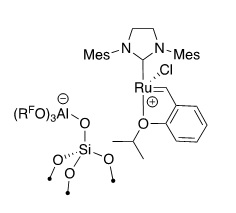Heterogeneous Ruthenium Catalysts for Olefin Metathesis
Background
Grubbs catalyst is highly efficient in the reversible formation of carbon-carbon double bonds, known as olefin metathesis. Grubbs catalyst is a homogeneous catalyst; it is in the same phase as unreacted starting materials and products thus making it costly to remove. Heterogeneous/supported catalysts resolve this problem because they are in a separate phase from the reactants and product thereby allowing such catalysts to be removed with ease.
Brief Description
Professor Matthew Conley from the University of California, Riverside has developed heterogeneous ruthenium catalysts for olefin metathesis. These catalysts have higher activity than state-of-the-art homogeneous catalysts in metathesis of terminal olefins. They are combined with state-of-the-art anion capped materials that anchor positively charged Grubbs catalyst to the surface to form active heterogeneous olefin metathesis catalyst. This technology has the potential to produce heterogeneous catalysts that are less expensive, more efficient, and faster than the available homogenous ruthenium catalysts for olefin metathesis.

Fig 1: Chemical structure of UCR’s heterogneous Grubb’s catalyst supported on functionalized silica for olefin metathesis.
Application
- A highly efficient heterogeneous ruthenium catalyst for olefin metathesis for use in potential applications such as the production of commecial, industrial, and consumer materials.
Patent Status
| Country | Type | Number | Dated | Case |
| Patent Cooperation Treaty | Reference for National Filings | WO 2024/015469 | 03/28/2024 | 2023-953 |
Patent Pending
Contact
- Grace Yee
- grace.yee@ucr.edu
- tel: View Phone Number.
Other Information
Keywords
ruthenium, catalyst, metathesis, Grubbs, silylium
